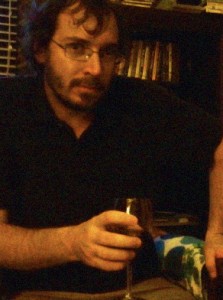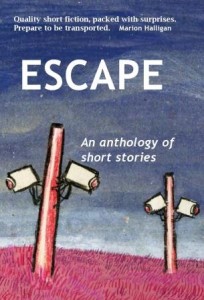 1. Who are the short fiction authors you admire (Australian or otherwise, alive or dead)?
1. Who are the short fiction authors you admire (Australian or otherwise, alive or dead)?
Well, David Foster Wallace, for one, obviously. Here are some others: ZZ Packer, Robert Drewe, Jhumpa Lahiri, Grace Paley, Sam Shepard, Richard Yates. But also, I often read a story somewhere that totally blows me away—in the New Yorker, or an anthology or something—and I resolve to remember the name of the author and track down more of his or her work, but then I forget. But I admire them too.
2. What is the most memorable short story you have read? And why does it stand out for you?
It’s hard to pick just one, but “Why Don’t You Dance” by Raymond Carver had a profound effect on me when I first read it, and is probably largely responsible for my lifelong interest in short fiction. I thought, “I didn’t realise you could do this! I want to do it too!” It’s a great example of the short story form at its best. It hooks you in right away: “In the kitchen, he poured another drink and looked at the bedroom suite in his front yard.” The writing is tight and spare, mostly single lines of back-and-forth dialogue, but there’s so much going on—the man’s unusual reaction to the end of his marriage, the dynamics between him and the young couple, the way the young couple relate to each other. It’s the kind of story you think about a lot afterwards, you go back and read it again and again, savouring the words on the page, mulling over the layers. And it has a quintessential Raymond Carver ending, with the point of view shifting suddenly from the older man to the young woman trying to tell the story to her friends afterwards: “There was more to it, and she was trying to get it talked out. After a time, she quit trying.” What an ending! Goddamn. It’s a good fucking story.
3. What do you like about the short story form?
It’s so flexible. What makes a short story, really? A block of prose under, say, 9000 words? Beyond that, you can be as experimental as you want. I also love the economy of short stories; every sentence has a reason to be there. When a short story is good, when it really works, it affects you just as much as a good novel, but it’s in a highly concentrated form. It’s like freebasing literature.
4. How would you describe your own writing?
I tend to write pretty short stories, usually based around some quirky premise or character. I usually like to use dialogue and action more than exposition, so people sometimes tell me my stories read like short films. I don’t know about you, but I hear the story in my head when I read, and good writing is a pleasure to “listen” to. So I try to pay attention to the sounds and rhythms of the sentences. When I’m revising my work, I read it over and over, listening for places where it doesn’t flow quite right and fiddling around with the text until it does.
5. Which of your stories are you most fond of right at this moment and why?
I wrote a story about a rich guy who has a skyscraper built in the middle of the desert just because he’s interested in seeing what it would look like. I’m rather fond of it, though I’m not quite sure why. I think it has some deeper meaning, but I’m not quite sure what.
6. Where do the ideas for your stories come from? (Take us through an example)
They come from all sorts of places. Sometimes mid-conversation with someone I’ll think, Hey that could be a good story! Often they come at rather inconvenient times, like when I’m in bed almost asleep, or driving, or in a meeting at work, or in the shower. But I’ve learned the hard way that no matter how much I think I will remember a good idea later on, all I will remember is that I had the idea, not what it was, so I always try to write ideas down somewhere. I have various notebooks and scraps of paper and Word documents scattered around with random bits: plot ideas, characters, sentences, sometimes just a word I liked at the time. When I feel like doing some writing, I leaf through the notes and look for something that interests me.
7. What is your writing process – from idea to publication? (Do you go it alone or are others involved?)
I am not at all disciplined about writing. I write very sporadically. I always feel like I need to be in just the right state of mind, and then I usually just spend an hour rewriting the first sentence over and over. I know that a writer should really write every day, even if it’s total crap, just for the sake of putting words on the page, to develop the habit so that when a good idea comes along, they’ll have the chops to take it somewhere. But even though I know that, and constantly resolve to do it, I don’t do it. I had a writing teacher who said that every semester she saw two or three people in her class who had real talent, but only every few years did she see someone who had the other, more rare quality that makes a writer: the strength of character to sit down every day and do the work, to forego social events and television and Facebook and just put in the hours at the keyboard. Unfortunately, I am not known for self-discipline. But on the rare occasions when I do write something half-decent, it’s usually in one hit—I get in the zone and the story just tumbles out. I then read it over for a few days, fiddling around with the words a bit. I bring it along to a meeting of The Beak, my writing group, I get a writer friend to look it over, I get my wife to read it, and get feedback from them all, which I incorporate into the story if it seems like a good idea. Next I move the Word file to a folder on my computer called “Finished.” Every now and then I look through the stories in the “Finished” folder and think, well, yeah, I guess some of these are all right. Once in a while I submit something.
8. Do you feel the short story form is valued in Australia? What makes you say this?
Last year I went to a talk at a conference where this e-publishing guru from California said he saw a great business opportunity for something like iTunes selling short stories for e-readers. He predicted that the digital age would bring about the renaissance of the short story, but I’m not sure I agree with that. I think short stories have a lot of competition for people’s shorter attention timeslots nowadays: television, YouTube, Facebook, Angry Birds. For the longer attention timeslots, novels only have to compete with television series and maybe those role playing video games. But there is definitely still a niche of people who enjoy reading short fiction, probably populated mostly by people who are also interested in writing it, and that niche in Australia is just as robust as anywhere else. We have a very respectable number of literary journals and Graduate Writing programs per capita.
9. How do you feel about your work being published in non-print forms such as digital and audio?
I know digital is the future and I don’t want to be an old fuddy-duddy, but there’s still something kind of cheap and soulless about it. Reading stuff online or on a Kindle just isn’t the same experience as reading a book or magazine, and never will be. Now, audio is interesting because there you’re venturing into the territory of performance—the art of reading a story well. It would be interesting to hear something I’d written as an audio item. But I will still always hold print in the highest regard. There’s a certain honour that derives from somebody deciding your work is good enough to be printed.
10. What advice would you like to offer Spineless Wonders?
Keep forging ahead. Build a short fiction empire!
A native of Washington, D.C., Jon Steiner moved to Australia in 2000. He studied writing at the University of Technology, Sydney and has been published in the UTS Writers’ Anthology. In 2010, his short story, The Robber, was published by Parsnip Press and can be purchased from parsnippress@bettinakaiser.com
Follow Us:
Share this page:
